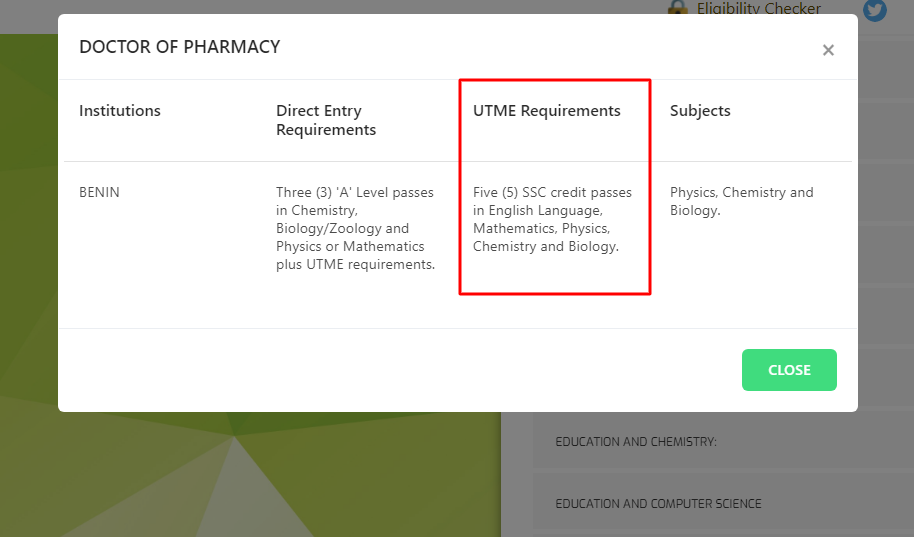Physical Address
304 North Cardinal St.
Dorchester Center, MA 02124

Discover How to Combine WAEC and NECO results for Admission and Secure Your Spot in University- Don’t Let One Sitting Define Your Future.
Getting into the university of your dreams can feel like an overwhelming task, especially when you’re unsure about how your O’Level results will be accepted. If you’re asking yourself, “Can I combine WAEC and NECO for admission?”—you’re not alone.
Many students face the challenge of not meeting the minimum requirements in one sitting, but the good news is you don’t have to start over. You can combine your WAEC and NECO results to meet the admission requirements for universities, and in this article, we’ll show you exactly how.

In this comprehensive guide, we’ll answer all your questions about combining WAEC and NECO results for university admission, provide step-by-step instructions on how to combine your results successfully, and give you valuable resources, including how the ExcelMind app can help you pass these exams with ease.
Read Also: WAEC Result 2025: How to Check WAEC Result and Succeed
The Short Answer is Yes
You can combine WAEC and NECO results for admission to most Nigerian universities, but there are some important rules you need to understand. Whether or not you can use both results depends on several factors, such as the university you are applying to, the course you want to study, and the specific admission requirements for your chosen course. Let’s dive deeper into the requirements and restrictions.
When combining your O’Level results, it’s important to understand the different types of subjects you’ll be working with. Core, Mandatory, and Optional terms are critical to knowing how to approach your results.

If you fail a core subject, that can be a problem. But if you have a core subject failure in one exam (like WAEC) and a pass in the same subject in another exam (like NECO), you can combine the results to meet the university’s requirements.
Most universities in Nigeria allow you to combine WAEC and NECO results, but there are exceptions. Here’s how it typically works:
However, the specific rules depend on the course and university. Some universities allow combined results for almost all courses, but others, particularly for competitive programs like Medicine, Law, Pharmacy, and Engineering, may not accept combined results. For these courses, universities often require all subjects to be from the same sitting.
Yes, your course of study plays a huge role in whether combined results are accepted. Here’s a general breakdown:
Before applying, always check the university’s admission guidelines and speak to the admissions office directly if you’re unsure.
READ: When is the NECO Exam Starting in 2025? Your Guide to Success
You have the power to combine WAEC and NECO results to gain admission into your dream university, but what if you’re not feeling confident about your grades? The good news is that ExcelMind is the perfect solution for you.

ExcelMind is an AI-powered learning tool designed to help students like you succeed in their O’Level exams. It provides predictive analysis based on past exam questions, personalized assessments, and gamified learning experiences that make studying more engaging and effective. Here’s how ExcelMind can help you pass your exams with ease:
Using ExcelMind ensures that you’re not only prepared to combine your results, but also to pass the exams themselves with flying colors. Whether you need to pass one subject or all five, ExcelMind is the solution that will guide you to success.
Now that you know the basics of combining your results, here’s a simple step-by-step guide on how to combine WAEC and NECO results for admission:
Here’s a list of universities that typically accept the combination of WAEC and NECO results for admission. Make sure to double-check with the university for specific course-related restrictions:
If you want to combine WAEC and NECO results, these universities should be your go-to options, but always verify with the school’s admission office to ensure no recent changes to their policies.
Yes! Even if you have poor results in one sitting, combining your WAEC and NECO results could still give you a shot at gaining admission. Many students who didn’t perform well in one exam have successfully combined their results to meet university admission requirements.
Don’t let a few low grades discourage you. With the right approach, such as using ExcelMind to improve your weak subjects, you can still achieve the grades you need.
See Also: WAEC Subjects for Business Administration: Your Path to Success
Are you ready to take control of your future and pass your O-Level exams with ease? Don’t wait any longer, download ExcelMind today and start your journey towards academic success. With personalised study plans, mock exams, and predictive learning, ExcelMind is the ultimate tool to help you pass your WAEC and NECO exams and gain admission into the university of your dreams.
Don’t settle for less. Visit ExcelMind now and start studying smarter, not harder. Your future starts with the right tools, and ExcelMind is here to help you every step of the way.
Yes, Osun State University (UNIOSUN) accepts the combination of WAEC and NECO results for admission. This means you can use credits from both WAEC and NECO to meet the university’s O’Level requirements. This policy applies to most courses offered at the university.
Important Considerations:
Two-Sitting Policy: UNIOSUN allows candidates to combine results from two sittings. This flexibility is beneficial for students who may not have obtained all required credits in a single sitting.
Core Subjects: Ensure that you have credit passes in the core subjects required for your intended course. For example, courses in the sciences typically require credits in English Language, Mathematics, Biology, Chemistry, and Physics.
Yes, the University of Benin (UNIBEN) accepts the combination of WAEC and NECO results for admission into most of its undergraduate programs. This means you can use credits from both WAEC and NECO to meet the university’s O’Level requirements.
Key Points to Note:
Two-Sitting Policy: UNIBEN allows candidates to combine results from two sittings. This flexibility is beneficial for students who may not have obtained all required credits in a single sitting.
Core Subjects: Ensure that you have credit passes in the core subjects required for your intended course. For example, courses in the sciences typically require credits in English Language, Mathematics, Biology, Chemistry, and Physics.
Professional Courses: While most courses accept combined results, it’s advisable to verify specific requirements for professional courses such as Medicine, Law, and Nursing, as some universities may have stricter policies for these programs.
Here are some Nigerian universities that accept the combination of WAEC and NECO results for admission:
Federal Universities
Federal University of Agriculture Makurdi (FUAM)
Federal University of Technology Akure (FUTA)
Federal University Dutse (FUD)
Federal University Lafia (FULAFIA)
Federal University Lokoja (FULOKOJA)
Federal University Oye-Ekiti (FUOYE)
Federal University Wukari (FUWUKARI)
Federal University of Technology Owerri (FUTO)
Federal University of Petroleum Resources Effurun (FUPRE)
Federal University of Agriculture Abeokuta (FUNAAB)
Federal University of Agriculture Zaria (FUAZ)
Federal University Birnin Kebbi (FUBK)
Federal University Gusau (FUGUS)
Federal University Gashua (FUGASHUA)
Federal University Birnin Kebbi (FUBK)
Federal University Gombe (FUGOMBE)
Federal University Lokoja (FULOKOJA)
Federal University of Technology Minna (FUTMINNA)
Federal University of Technology Yola (FUTY)
Federal University of Technology Owerri (FUTO)
Federal University of Petroleum Resources Effurun (FUPRE)
Federal University of Agriculture Makurdi (FUAM)
Federal University of Technology Akure (FUTA)
Federal University of Agriculture Zaria (FUAZ)
Federal University of Agriculture Abeokuta (FUNAAB)
Federal University of Petroleum Resources Effurun (FUPRE)
Federal University of Technology Minna (FUTMINNA)
Federal University of Technology Yola (FUTY)
Federal University of Technology Owerri (FUTO)
Federal University of Petroleum Resources Effurun (FUPRE)
Federal University of Agriculture Makurdi (FUAM)
Federal University of Technology Akure (FUTA)
Federal University of Agriculture Zaria (FUAZ)
Federal University of Agriculture Abeokuta (FUNAAB)
Federal University of Petroleum Resources Effurun (FUPRE)
Federal University of Technology Minna (FUTMINNA)
Federal University of Technology Yola (FUTY)
Federal University of Technology Owerri (FUTO)
Federal University of Petroleum Resources Effurun (FUPRE)
Federal University of Agriculture Makurdi (FUAM)
Federal University of Technology Akure (FUTA)
Federal University of Agriculture Zaria (FUAZ)
Federal University of Agriculture Abeokuta (FUNAAB)
Federal University of Petroleum Resources Effurun (FUPRE)
Federal University of Technology Minna (FUTMINNA)
Federal University of Technology Yola (FUTY)
Federal University of Technology Owerri (FUTO)
Federal University of Petroleum Resources Effurun (FUPRE)
Federal University of Agriculture Makurdi (FUAM)
Federal University of Technology Akure (FUTA)
Federal University of Agriculture Zaria (FUAZ)
Federal University of Agriculture Abeokuta (FUNAAB)
Federal University of Petroleum Resources Effurun (FUPRE)
Federal University of Technology Minna (FUTMINNA)
Federal University of Technology Yola (FUTY)
Federal University of Technology Owerri (FUTO)
Federal University of Petroleum Resources Effurun (FUPRE)
Federal University of Agriculture Makurdi (FUAM)
Federal University of Technology Akure (FUTA)
Federal University of Agriculture Zaria (FUAZ)
Federal University of Agriculture Abeokuta (FUNAAB)
Federal University of Petroleum Resources Effurun (FUPRE)
Federal University of Technology Minna (FUTMINNA)
Federal University of Technology Yola (FUTY)
Federal University of Technology Owerri (FUTO)
Federal University of Petroleum Resources Effurun (FUPRE)
Federal University of Agriculture Makurdi (FUAM)
Federal University of Technology Akure (FUTA)
Federal University of Agriculture Zaria (FUAZ)
Federal University of Agriculture Abeokuta (FUNAAB)
Federal University of Petroleum Resources Effurun (FUPRE)
Federal University of Technology Minna (FUTMINNA)
Federal University of Technology Yola (FUTY)
Federal University of Technology Owerri (FUTO)
Federal University of Petroleum Resources Effurun (FUPRE)
Federal University of Agriculture Makurdi (FUAM)
Federal University of Technology Akure (FUTA)
Federal University of Agriculture Zaria (FUAZ)
Federal University of Agriculture Abeokuta (FUNAAB)
Federal University of Petroleum Resources Effurun (FUPRE)
Federal University of Technology Minna (FUTMINNA)
Federal University of Technology Yola (FUTY)
Federal University of Technology Owerri (FUTO)
Federal University of Petroleum Resources Effurun (FUPRE)
Federal University of Agriculture Makurdi (FUAM)
Federal University of Technology Akure (FUTA)
Federal University of Agriculture Zaria (FUAZ)
Federal University of Agriculture Abeokuta (FUNAAB)
Federal University of Petroleum Resources Effurun (FUPRE)
Federal University of Technology Minna (FUTMINNA)
Federal University of Technology Yola (FUTY)
Federal University of Technology Owerri (FUTO)
Federal University of Petroleum Resources Effurun (FUPRE)
Federal University of Agriculture Makurdi (FUAM)
Federal University of Technology Akure (FUTA)
Federal University of Agriculture Zaria (FUAZ)
Federal University of Agriculture Abeokuta (FUNAAB)
Federal University of Petroleum Resources Effurun (FUPRE)
Federal University of Technology Minna (FUTMINNA)
UNIOSUN Admission Requirements
UTME (JAMB) Candidates:
A minimum of five credit passes in relevant subjects, including English Language and Mathematics, obtained at not more than two sittings.
An acceptable score in the Unified Tertiary Matriculation Examination (UTME).
Direct Entry Candidates:
At least five credit passes, including English Language and Mathematics, in relevant subjects.
Additional qualifications such as A-Level, OND, HND, or NCE with a minimum of Lower Credit.
Important Notes:
For courses like Medicine, Nursing, and Law, candidates are typically required to have all five credits in one sitting.
Candidates must upload their O’Level results to the JAMB CAPS portal as a precondition for admission.
Participation in the university’s Post UTME Screening is mandatory.